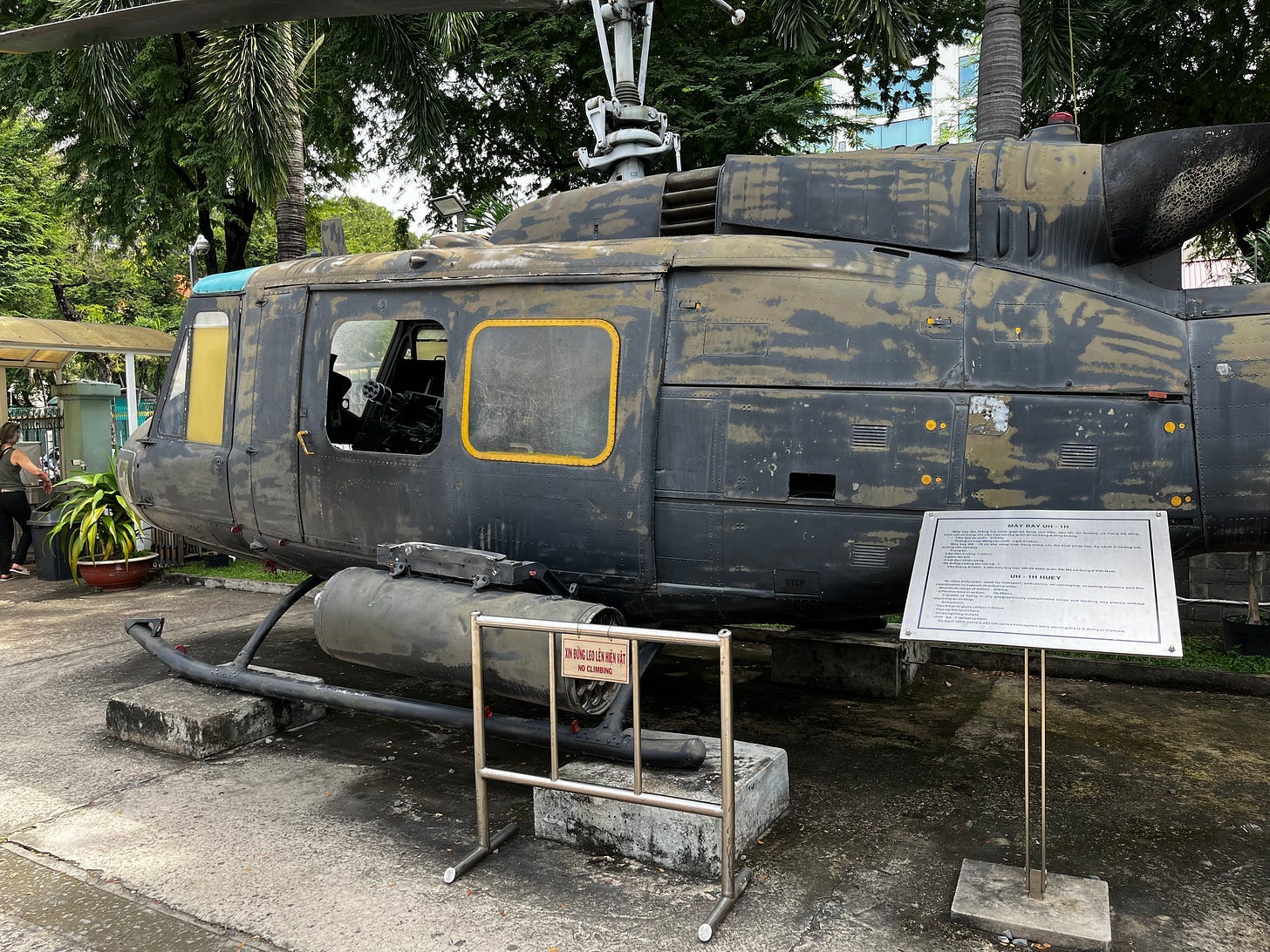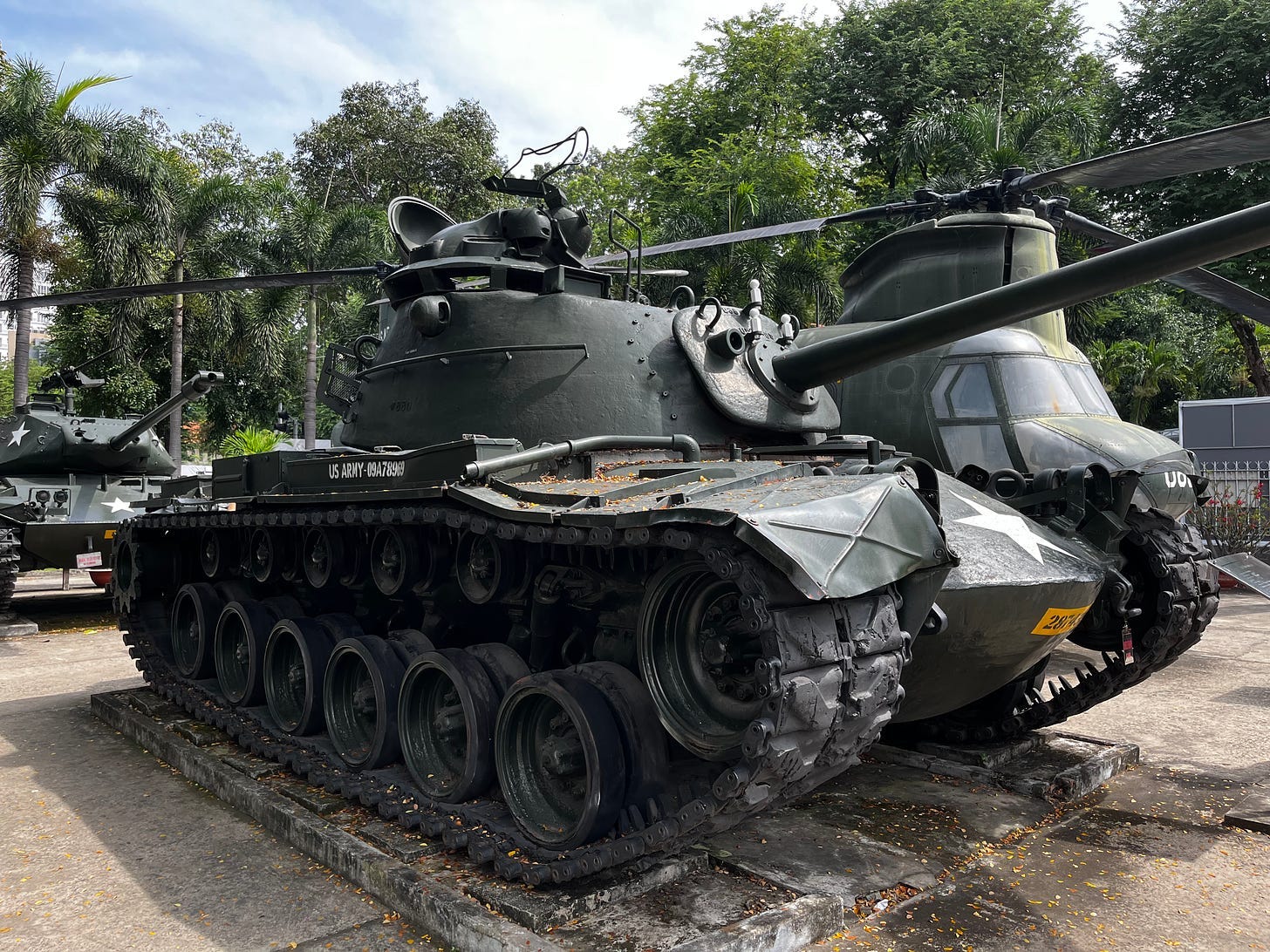The Senselessness of Certain Wars: Reflections from Vietnam to Ukraine
By Hans Mahncke
I have been a huge fan of Vietnam and its people ever since my first visit 25 years ago. It is a truly special place, which is why I recently returned for the first time since the Covid pandemic. While Vietnam’s charm and uniqueness remain unchanged, this visit carried a different tone. I have explored the Cu Chi Tunnels, the War Remnants Museum, and observed daily life in Vietnam many times before, but this time felt different. Perhaps because Trump had just been re-elected, offering a renewed possibility for change and peace, I found myself repeatedly reflecting on the Vietnam War—especially on the lessons it should have taught us about the ongoing conflict in Ukraine.
War Remnants Museum, Saigon (credit: Hans Mahncke)
The War Remnants Museum in Saigon, in particular—filled with military equipment left behind by the United States—is a place that everyone should try to visit at least once. It stands as a powerful testament not only to the immense human cost of war—something all war museums convey—but also to the particular senselessness of the Vietnam War.
The centerpiece of the War Remnants Museum is its collection of abandoned American military equipment, and for good reason. These relics powerfully convey the museum's core message: the folly of intervening in a distant conflict with inadequate understanding, engaging in extensive bombing, and then retreating when plans fail, leaving chaos behind. Yet, there’s no sense of triumph or gloating. The abandoned equipment speaks for itself. If blame is assigned at all, it points to the corrupt South Vietnamese leadership, while the United States is portrayed more as a misguided participant—entangled in a conflict it neither understood nor should have joined in the first place.
War Remnants Museum, Saigon (credit: Hans Mahncke)
In the same vein, what struck me most during my visit, and not for the first time, was the remarkable warmth and kindness that the Vietnamese people extend toward foreigners, particularly Americans. This contrast between past conflict and present-day hospitality not only highlights the resilience and forgiveness of the Vietnamese people but also underscores the profound tragedy of the conflict. The pain and suffering endured appear even more tragic when contrasted with the reality that these two nations never needed to have confronted each other at all.
The Vietnam War was, at its core, a struggle for independence and self-determination. From the American perspective, however, it became a quagmire of fundamental misunderstandings and strategic missteps. Often overlooked amidst conflicting narratives is the fact that, after enduring a century of French colonial rule, the Vietnamese people’s foremost priority was achieving independence. Foreign intervention, regardless of intent, was unlikely to succeed in such a context. The United States' failure to grasp this reality led to its involvement in a conflict that was both senseless and unwinnable. But, driven by exaggerated Cold War fears, much like media narratives shaping discussions of the ongoing war in Ukraine, the United States chose to intervene.
War Remnants Museum, Saigon (credit: Hans Mahncke)
Indeed, the sense of futility surrounding the Vietnam War is not confined to history. The parallels with the current situation in Ukraine are striking. Once again, a regional dispute has been escalated by external powers, particularly the United States, under the banner of ideological or strategic imperatives. In both cases, local tensions were amplified, turning what might have remained contained conflicts into international crises with profound global repercussions.
What’s particularly tragic in both wars is the role of miscalculated intervention. In Vietnam, American involvement intensified a civil war, transforming it into a Cold War battleground at the cost of millions of lives. In Ukraine, while the stated motivations focus on defending sovereignty and democracy, the consequences are just as dire: countless dead, displaced populations, and a precarious drift toward World War III.
In both instances, U.S. involvement was framed as pursuing noble goals—whether fighting communism or upholding the international order—but the outcomes reveal a different reality, marked by immense human suffering and global instability.
The origins of the Ukraine war are more complex than often portrayed in legacy media narratives. It did not begin with Putin’s invasion in February 2022 but can be traced back to the political upheaval of February 2014, when then-Vice President Joe Biden approved a coup d'état that resulted in the ousting of Ukraine’s democratically elected government. This event ignited a decade-long civil conflict between the country’s Russian-speaking and Ukrainian-speaking regions.
Setting aside, for a moment, that Biden foolishly revived centuries-old ethnic tensions, what interest does the United States have in this situation? And how is American involvement going to resolve these deep-seated feuds?
But it’s even worse than. American involvement in Ukraine is, in at least one key respect, even more problematic than its involvement in the Vietnam War. While Vietnam was already embroiled in a civil war before the U.S. became involved, in Ukraine, external intervention—specifically by Joe Biden—was instrumental in igniting the civil war in the first place. This distinction underscores the profound and far-reaching impacts of foreign intervention in local disputes. In Ukraine's case, the initial disagreement revolved around the country's choice of trade agreements. But why would that ever be a decision for Joe Biden to make?
War Remnants Museum, Saigon (credit: Hans Mahncke)
As I traveled through Vietnam, I felt the weight of these connections. A war fought decades ago in the name of ideology now serves as a stark lesson in unintended consequences, yet similar mistakes are being repeated today. The remnants of the Vietnam War—rusting tanks, poignant photographs of victims, and harrowing stories of suffering—stand as haunting reminders of the devastation wrought when foreign powers escalate regional disputes into proxy wars.
What makes this situation even more tragic is how avoidable such conflicts are. The Vietnam War did not have to unfold as it did. The United States did not have to assume the role it played. The lessons learned from Vietnam should inform our understanding of Ukraine: wars waged far from home, under the pretense of noble ideals, often cause more harm than good to those they purport to protect.
This visit to Vietnam left me with a profound sense of sorrow—more so than any previous trip. It was not only for the lives lost and futures shattered but also for the cyclical nature of human folly. Perhaps by acknowledging the senselessness of one war, we can prevent the unnecessary escalation of another.





Hans, What is the personal connection with Vietnam that finds you making multiple trips there? A good article that could be made more so with an introduction identifying your personal identification with the country.